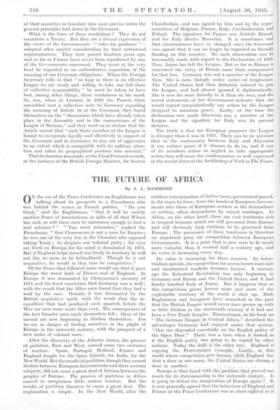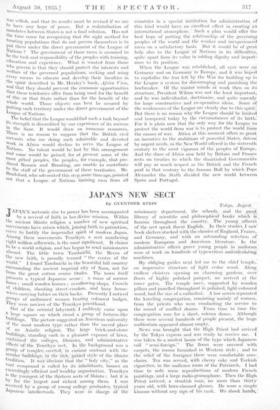THE FUTURE OF AFRICA By J. L. HAMMOND O N the
eve of the Peace Conference an.Englishman was talking about its prospects to a Frenchman who was behind the scenes in French politics. " Do you think," said the Englishman, " that it will be merely another Peace Of Annexations, in spite of all that Wilson has said, or will these men be statesmen enough to find a real Solution ? " ." You must remember," replied the Frenchman,' that Clemenceatkis. not a man for Empire ; he was one of the very 'few in the Chamber Who opposed taking Tunis ; he despises our colonial Party ; his eyes are'fixed on Europe, for his mind is dominated by 1871. But 'if England helps herself too'freely to territory he will not like to seem to be behindhand. Though he is not acquisitive, he would in that case be. competitive."
Of the Peace that followed some would say that it gave EiirOpe the worst both of France and of England. 'In Europe it Was doMinated by Clemeneeau's memory of 1871. and his fixed conviction that Germany was a wolf; with the result that the Allies soon found that they had a wolf by the ears. Outside it was dominated by the British acquisitive spirit, with the result that the in- equalities that had produced such quarrels before the War are now more acute than ever. The consequences of the first blunder soon made thernselves felt ; those of the second are now beginning to diSelose themselves. For we are in danger of finding ourselves in the plight of Europe in the sixteenth century, with the 'prospect of a new series of colonial wars.
After the discovery of the Atlantic routes, the process of partition, East and West, caused some two centuries of warfare. Spain, Portugal, Holland, France and England fought for the Spice Islands, for India, for the New World. But the results of partition, though they caused friction between European Governments and their oversea subjects, did not cause a great deal of friction between the peoples of Europe. The process of partition in Africa caused in comparison little serious warfare. But the results of partition threaten to cause a great deal. The explanation is simple. In the New World, .after the ruthless extermination of dative races, government passed, in the main by force, from the hands of European Govern- Meats into those of European settlers or the descendants of settlers, often descendants by mixed marriages. In Africa, on the other hand, there are vast territories rich, in tropical treasure which are still governed from Europe and will obviously lOng continue to be governed from Europe. The possession of these territories is therefore an important prize for competition between European, Governments. It is a prize that is now seen to be much more valuable than it seemed half a century ago, and its value is increasing every day.
Its value is increasing for three . reasons. As inclus-: trialism spreads, the competition for access toraw materials. and unsaturated markets becomes keener. A century ago the Industrial Revolution was only beginning in Germany and Russia and the United States, and it had hardly touched Italy or Japan. But it happens that as this competition grows keener more and more of the. exploitable territory of the world is shut , up. , Both Englishmen and foreigners have, remarked in. the past that the British Empire would never have grown up with so little friction in the nineteenth century if it had not been a Free Trade Empire. Zimmermann, in his book on " The German Empire in Central Africa," described the advantages Germany had enjoyed under that system. " Our rise depended essentially on the English policy of, the Open Door." Therse was a time when it looked, as if the English policy wa.s going to be, copied by other nations. Today the drift its the .other way; England, copying the Proteetionist exaniple. Lastly, , in tlgs, world where competition,gets keener, vk:hile. England has shut a door in one sense, the P inted States are closing a door in another. , Europe is thus faced with the. problem that proved too, much for its statesmanship in the sixteenth century. Is it going to defeat the imagination of Europe again ? It is now.generally agreed that the. behaviour of England and France at the Peace Conference was as short-sighted as it was selfish, and that its results must be revised 'if Wre are to have any hope of peace. But a redistribution of Mandates between States is not'a final solution. Has not the time come for recognising that the right • method for treating populations that do not govern 'themselves is tet luit them under the direct government of the League of Nations ? The goVernment of these races is assumed to be the task and responsibility of the people's with training, education and experience. What is wanted froth those Who govern is that they should protect the interests and welfare of the governed populations, 'seeking and using every means to educate and develop their faculties in the spirit described in Mr. Huxley's book; Africa View, and that they should prevent the economic opportunities that these territories offer from being used for the benefit of this or that State rather than for the benefit of the whole world. Those objects can best be secured by putting such territory under the direct government of the League of 'Nations.
The belief that the League would' ind such a task beyond its strength is discredited by our experience of its success in the Saar. It would draw on immense resources. There is no reason to suppose that the British civil servants who are doing such admirable and devoted work in 'Africa would decline to serve the League of Nations. No talent would be lost by this arrangement and some would be gained, for at present some of the Most gifted peoples, the peoples, for example, that pro-: doeed Nansen and Branting, are unable to contribute to the staff of the government of these territories. Mr. Rrailsford, who advocated this step.some time ago, pointed out that a League of Nations training men from all countries in 'a 'special institution 'for adininiStratimi of , this kind would have an 'eXcellent effeet in creating an international atmosphere. Such a plan wonid 'offer the best hope of putting' the relationship of the governing peoples Of the world' and the Weaker and inexperienced races on a satisfactory ' But it would 'be of great help also to the Leigne -Of. Nations in its difficidtiesc quite apart from its 'wane in 'adding dignity and import= ance to its When the 'League' was ' established, all eyes were', on and on Germany' in Europe, and it was' hoped to' capitalise the fear left by the War for building up in the League a system for discouraging and pithishitig the lawbreaker. Of the master minds Work then on its structure, President Wilson was not the least iniportant, and he was individualist, doctrinaire; and quite unready for large constructive and co-operative ideas. SOnfe 'Of the weaknesses of the League are clearly due to this'spiritl But there is no reason why the League should be limited and hampered 'today by the circumstances of its birth.' For it 'is plain now that the only way for the League to protect the world from War is to protect the wrorld froin the causes of war. Africa at this moment offers as great, an incentive to the ambitions of Powerful States, driven by urgent' needs, as the New World offered in the sixteenth century to the rribst Vigorous of the peoples of EtiroPe. And the share of Africa now 'held by Britain and' France rests on treaties to' which the dissatisfied' GoVernmerits will pay as much respect as the British and the French paid in that century to the famous Bull by which Pope Alexander' the Sixth 'divided the new world between Spain and Portugal.



































 Previous page
Previous page